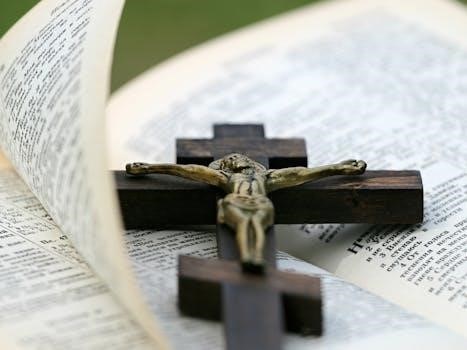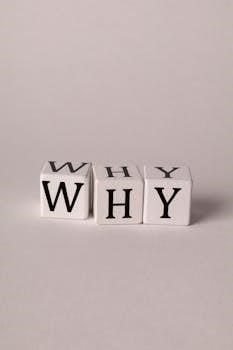Chapter 6 Overview
Chapter six of Lord of the Flies‚ often titled “Beast from Air‚” introduces new fears and anxieties among the boys․ They grapple with the possibility of an external threat‚ moving away from internal conflicts․ This chapter highlights a pivotal shift in their perception of safety‚ order‚ and the island environment‚ marking a turning point in the narrative․

Summary of Events
The chapter begins with the boys still reeling from their recent encounter with the supposed beast․ A significant event occurs when military aircraft engage in a nighttime battle above the island‚ resulting in a dead parachutist landing on the mountain top․ The boys‚ asleep and unaware‚ do not witness this event․ However‚ when Sam and Eric awaken to tend the fire‚ they believe they saw a fearsome beast‚ enhancing the fear already circulating among the group․ They rush back to the camp to report their sighting‚ causing general panic․ The boys then organize a hunt‚ with Jack taking the lead to investigate the supposed beast on the mountain․ Ralph‚ while hesitant‚ feels compelled to go as well․ This decision further increases the tensions between the two leaders․ The boys‚ consumed by fear‚ neglect the fire‚ a symbol of rescue and civilization‚ demonstrating their dwindling focus on their original goal․ This chapter is marked by fear‚ panic‚ and the growing dominance of savagery․
Key Conflicts
The central conflict in this chapter revolves around the boys’ fear of the “beast from air‚” which is actually the dead parachutist‚ and how that fear amplifies their internal divisions․ There is an external conflict caused by the war happening outside the island‚ symbolized by the aircraft battle and the dead parachutist․ The major conflict here is between Ralph and Jack‚ as the leadership is openly challenged․ Jack takes control of the hunt‚ further undermining Ralph’s authority and highlighting the growing power of Jack’s instincts and the boys’ primal urges․ Another key conflict is the struggle between the boys’ rational desire for rescue and the primal fear of the beast․ The fire‚ a symbol of rescue‚ is neglected due to the fear‚ which highlights the conflict between civilization and savagery․ The chapter also shows a conflict between reality and perception‚ as the boys’ fear distorts the reality of the dead parachutist into a mythical beast․ These conflicts build tension and foreshadow greater conflicts to come․

Character Analysis in Chapter 6
Chapter six reveals shifts in character dynamics‚ with Ralph’s leadership facing increasing challenges․ Jack’s actions become more impulsive‚ and Piggy’s role as the voice of reason continues despite the growing fear․ This section explores their individual reactions to the events of the chapter․
Ralph’s Perspective
In chapter six‚ Ralph grapples with the growing unease and fear that the boys are experiencing‚ particularly after the supposed sighting of the “beast․” He attempts to maintain a sense of order and logic‚ clinging to the idea of the signal fire as their primary hope for rescue․ Ralph’s perspective is one of increasing frustration as he witnesses the boys’ descent into irrationality and their growing preference for Jack’s more primal and exciting approach․ He feels the weight of responsibility for the group’s well-being but struggles to connect with the boys who are becoming increasingly distant․ He desperately seeks to reinforce the rules and routines‚ trying to remind them of their initial goals․ The events of chapter six deepen Ralph’s concern and doubt about the possibility of restoring civilization on the island․ His focus on rescue and order is increasingly challenged by the boys’ shift towards savagery․
Jack’s Actions and Motivations
In chapter six‚ Jack’s actions and motivations become more clearly defined by his desire for power and control․ The appearance of the “beast” further fuels his instincts to hunt and dominate‚ providing an outlet for his suppressed aggression․ Jack is less concerned with rescue and maintaining order‚ and more focused on appealing to the boys’ fears and primal desires․ He sees the beast as a challenge‚ something to be conquered‚ which solidifies his position as a hunter and leader within the group․ He manipulates their fear and uses it to his advantage‚ further undermining Ralph’s authority․ Jack’s behavior in this chapter showcases his growing disregard for established rules and his increasing preference for the thrill of the hunt and the power it brings․ His actions are a clear step toward establishing a more savage and barbaric order on the island‚ driven by the appeal to boys’ darker instincts․
Piggy’s Role
Piggy’s role in chapter six continues to be that of the intellectual voice of reason‚ albeit one that is increasingly ignored by the other boys․ He is the one who tries to bring logic and rationality to the discussion about the beast from air‚ attempting to understand the situation through facts and observation rather than fear and speculation․ Piggy’s reliance on the conch‚ which represents order and civilization‚ underscores his commitment to a structured society․ He becomes increasingly marginalized as the boys gravitate towards Jack’s more primal approach․ Despite his efforts to maintain a sense of order and control‚ his voice is often drowned out by the growing tide of fear and savagery․ Piggy’s vulnerability is also highlighted‚ particularly in the face of Jack’s increasing power and the boys’ growing fear‚ which leaves him isolated and insecure․ His role becomes pivotal as a symbol of the intellectual and civilized values that are being rejected on the island․

Themes Explored in Chapter 6
Chapter six delves into themes of escalating fear and the boys’ reactions to it․ The concept of an external threat further erodes their sense of security․ This marks a shift towards savagery‚ the fragility of civilization‚ and the breakdown of their established order․
Loss of Innocence
In chapter six‚ the boys’ loss of innocence becomes increasingly apparent as they confront a new and terrifying idea⁚ a beast from the air․ This shift from the playful‚ exploratory phase to a state of fear and paranoia marks a significant decline in their initial hopeful outlook․ The previous belief in a manageable‚ albeit challenging‚ existence on the island is replaced by a palpable sense of dread and vulnerability․ The boys’ reactions to the parachutist’s body‚ which they mistake for the beast‚ highlight their growing susceptibility to fear and irrationality․ This event symbolizes a loss of clarity and rational thought‚ further indicating their descent into a more primitive state․ This perceived external threat accelerates the boys’ psychological and moral decay‚ pushing them further from their civilized origins and closer to a state of unchecked emotional responses and primal instincts․ The chapter thus serves as a stark illustration of how quickly the boys’ naivety and innocence are replaced by fear and suspicion․ The imagined beast from the air becomes a catalyst for their descent into savagery‚ solidifying the theme of lost innocence․
Savagery vs․ Civilization
Chapter six of Lord of the Flies vividly portrays the escalating conflict between savagery and civilization‚ as the boys grapple with the implications of a perceived external threat․ The initial attempts to maintain order and adhere to civilized rules begin to crumble under the weight of their fears and anxieties․ The rational approach of Ralph‚ who tries to organize a search party‚ contrasts sharply with the increasingly emotional and impulsive responses of others‚ particularly Jack․ This chapter emphasizes the fragility of civilization‚ as the boys’ innate desires for excitement and adventure overshadow their need for structure and cooperation․ Jack’s eagerness to hunt the supposed beast‚ and his willingness to abandon the conch’s authority‚ illustrate the growing allure of savagery․ The boys’ increasing reliance on fear rather than reason reveals how easily societal norms can be discarded in favor of primal instincts․ The perceived threat of the beast further accelerates the boys’ descent into a chaotic state‚ highlighting the constant battle within them between their civilized upbringing and their primitive urges․
The Breakdown of Order
In Chapter six‚ the breakdown of order becomes increasingly evident as the boys’ fear of the beast intensifies․ The carefully established system of rules and procedures‚ symbolized by the conch‚ starts to lose its significance․ Ralph’s attempts to maintain order and continue with their rescue plan are met with growing resistance‚ especially from Jack‚ who is more interested in hunting the beast․ The boys’ willingness to abandon the fire‚ a symbol of hope and civilization‚ for the thrill of the hunt‚ demonstrates the declining authority of the elected leader․ This chapter highlights the fragility of the boys’ society and the ease with which it can be disrupted․ The boys’ increasing disunity and lack of cooperation‚ fueled by fear and suspicion‚ shows how quickly the group can devolve from a semblance of order into chaos․ The breakdown of order is not just in their actions‚ but also in their thinking‚ as they become increasingly irrational and driven by their primal instincts․ The chapter signifies a significant shift towards savagery‚ with the boys abandoning their responsibilities and succumbing to their baser desires․

Questions and Answers
This section delves into specific inquiries arising from chapter six of “Lord of the Flies‚” examining key events and character motivations․ We will analyze these elements and discuss the impact they have on both the plot and the characters․
Specific Questions from Chapter 6
What is the “beast from air” that Sam and Eric encounter‚ and how does their description of it influence the other boys? How does the perception of an external threat impact the existing power dynamics on the island‚ particularly the leadership of Ralph and the growing influence of Jack? Why does Ralph decide to organize an expedition to explore the island after the sighting‚ and what does this reveal about his leadership style at this stage? What are the immediate reactions of the boys to the news of the “beast from air‚” and what does this show about their overall state of mind? How do the boys’ actions and comments in this chapter indicate a growing shift away from reason and towards fear and superstition? What is the significance of the boys’ increased focus on hunting and how does this relate to the emergence of the beast? How does the chapter portray the changing relationship between Ralph‚ Jack‚ and Piggy?
Analysis of Answers
The “beast from air” is a dead parachutist‚ but the boys’ fear amplifies its perceived threat‚ creating a tangible monster․ This external fear destabilizes Ralph’s authority‚ causing boys to gravitate towards Jack’s more primal leadership style which promises action and protection․ Ralph’s decision to explore shows his continued responsibility but highlights his struggle to maintain order amid growing panic․ The boys’ reactions‚ ranging from outright terror to a need for immediate action‚ show their vulnerability and a decline into irrationality․ The increasing focus on hunting reflects a shift towards primal instincts‚ intertwining with fear and the idea of the beast․ This chapter demonstrates a clear divergence in leadership styles between Ralph‚ who desires to maintain order‚ and Jack‚ who uses fear to gain power․ The relationship between Ralph‚ Jack‚ and Piggy is further strained‚ with Piggy becoming increasingly marginalized․
Impact on Plot and Characters
The discovery of the “beast from air” significantly propels the plot forward․ It creates a new dynamic of fear that drives the boys towards savagery‚ moving beyond simple disagreements․ Ralph’s struggle to maintain control intensifies‚ as the boys’ anxieties lead them to question his leadership and gravitate towards Jack’s more impulsive approach․ This chapter marks a significant turning point where the boys begin to prioritize immediate safety and the allure of the hunt over long-term planning and civilization․ It solidifies Jack’s position as a viable alternative leader‚ offering a sense of security through direct action․ Piggy’s role as the rational voice continues to diminish as the boys’ descent into irrationality deepens․ The chapter sets the stage for further conflicts‚ making it a pivotal moment in the breakdown of order on the island․ The beast’s presence becomes a catalyst for chaos and the further exploration of the boys’ primal instincts․